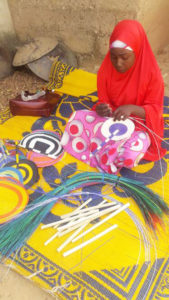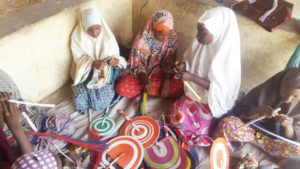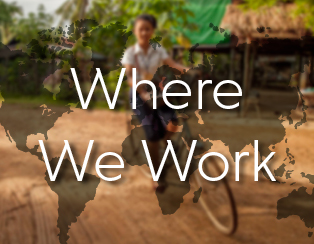In Nigeria, creating pathways to financial success for adolescent girls
By Chima Onwe and Natalie LovenburgApril 26, 2017

YOBE–Sitting on the ground in a circle surrounded by fellow adolescent girls, 16-year-old Hadiza Modu carefully weaves locally sourced plastic strands to produce decorative and functional hand fans of varied sizes and vibrant colors.
“I can create any design of hand fan I see,” she proudly says.
Modu is taking her future into the palm of her hands and turning a harsh reality into a positive opportunity.
Six years ago, Modu and her family fled her village after Boko Harm insurgents attacked her community of Buni Yadi, Gujba in Yobe state. Tragically, many of their neighbors were killed and injured.
After enrolling in the Nigeria Education Crisis Response program’s Adolescent Girls Program Center in her new village of Fika in Yobe state, Modu learned numeracy and literacy skills and how to make traditional Nigerian fans. The program is funded by the U.S. Agency for International Development and implemented by Creative Associates.
“In Northern Nigeria, we have had many years of limited access to girls’ education, low enrollment, and the Boko Haram insurgency made this problem even worse with the attacks on schools and abduction of girls,” says Helen John, Gombe State Team Leader of the Nigeria Education Crisis Response.
With the help of the communities, the program is increasing availability of safe and protective learning spaces that provide core academic subjects, wrap-around services like socio-emotional support and life skills for internally displaced out-of-school adolescent girls–as well as boys–in Adamawa, Bauchi, Borno, Gombe and Yobe states.
To date, the program has reached 88,653 children in 1,300 non-formal learning centers and 139 formal schools in the five northern Nigeria states.
John, who leads the gender empowerment initiative of the program, says, “After gaining basic education skills, the girls at the Adolescent Girls Program Centers are being empowered and taught marketable skills appropriate for the local context.”
Since most of the families lost everything, children want to find a way to contribute. Engaging experienced local artisans to train the girls on low-cost vocational skills, they learn income-generating activities to help support their families and buy school supplies for themselves. Along with weaving local hand fans, the adolescent girls are taught how to knit, embroider, make pomade and soap, and extract groundnut oil.
Modu perfected her fan-weaving skills, after the end of a nine-month non-formal education program. With the extra earnings, she covered the expense of her school uniform and purchased her own books.
“More than 4,200 girls have been mainstreamed through the program,” says John. “Enrollment in the Adolescent Girls Program Centers is up 56 percent.”
Engaging families to advance girls’ empowerment
“More than 4,200 girls have been mainstreamed through the program. Enrollment in the Adolescent Girls Program Centers is up 56 percent.”
Modu’s entrepreneurial spirit has been an essential part of her–even at a young age.
When she wasn’t assisting her family with farm duties in her former village, she joined her peers to sell cookies along the street to make extra money to support her parents and eight siblings.
However, when the family migrated to an overstretched village with many others internally displaced persons, accessing educational and financial opportunities in the community was severely limited.
“One day, I heard from a friend that children were enrolling into learning centers and community people are leading the program,” says Modu. “I informed my father and he supported me by finding out where the enrollment was taking place.”
During the vocational skill training at the Adolescent Girls Program Center, Modu says she became interested in producing hand fans.
“My village used to be very hot during Harmattan [a season of a dry, dusty, strong wind on the West African coast] and people often use whatever they can find to fan themselves, this was why I was interested in producing hand fans,” she explains.

Her father, Modu Abdullahi, says he is grateful to the program for not only providing education to his child, but also vocational skills that guarantees her financial independence.
With initial support from her father, Modu says she procured raw material and began producing and selling the hand fans in the local market, making a profit of between 500 Naira and 1,000 Naira ($1.58 and $3.17) weekly.
“The skills that she has acquired are a blessing not only to her but also the entire family, because she no longer requires money from me for her little demands,” says Abdullahi. “She also supports the needs of our family.”
Now as a trainer at the Adolescent Girls Learning Center, she’s sharing her fan-making skills with other young learners–empowering even more girls to be financial independent and boosting their confidence.
“Having the opportunity to teach the adolescent girls is highly cherished by my family and the community,” she says. “I will ensure I leave a legacy by providing these adequate skills with the girls before they graduate–so that they feel empowered and self-reliant.”


